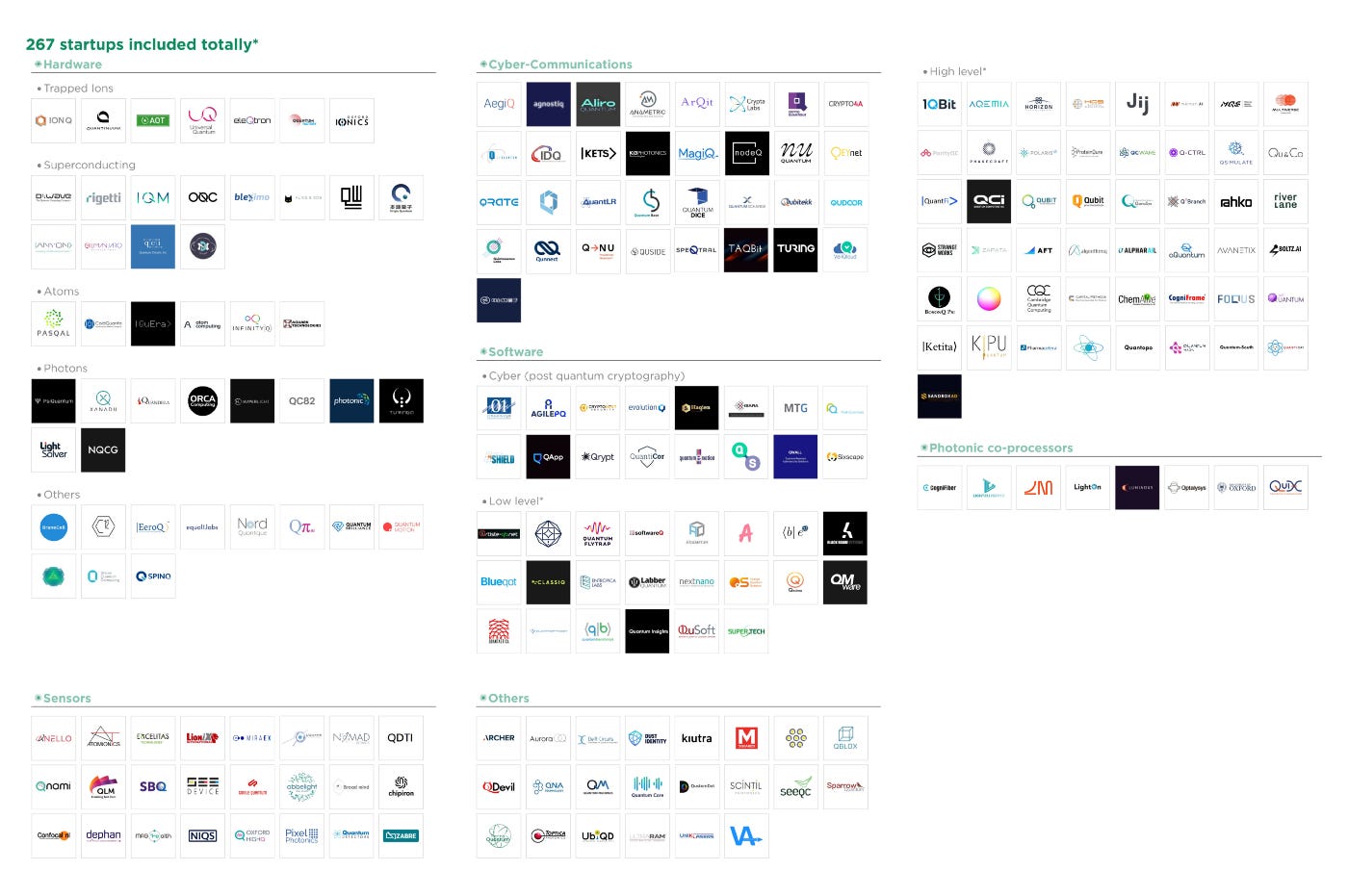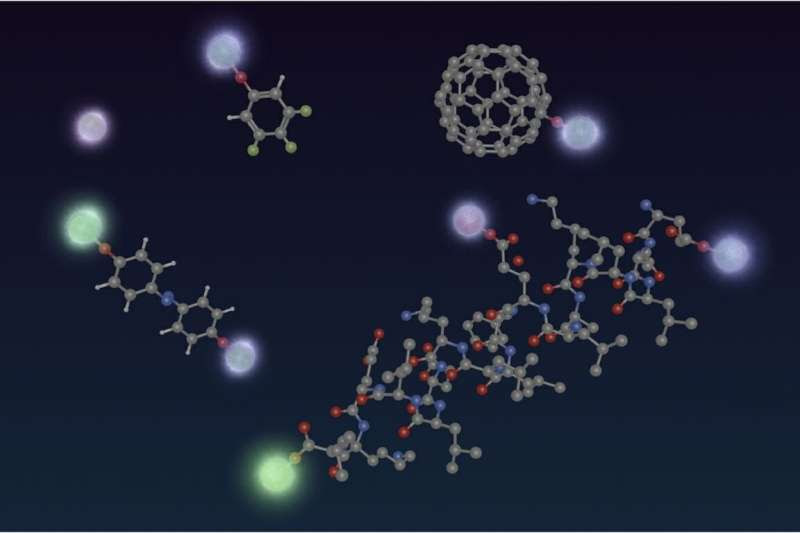The Week in Quantum Computing - August 8th - IonQ, Dwave, Quantinuum and error correction, Post-Quantum cryptography goes puff
Issue #99
The Week in Quantum Computing. Brought to you by Sergio Gago (@piratecto). This week Sponsored by QCentroid.
Do you like this Newsletter? Like, share and subscribe! :) (or do the three things in superposition :) ).
Quick Recap
Should I publish a newsletter during august? After all, not much will happen and everyone will be on vacation… WRONG! Because in the quantum world things happen all the time, every day!
First, a big milestone achieved by Quantinuum (article and paper below) where they have achieved a logical circuit to entangle and perform better than the classical counterpart, paving the way for error correction. A great report by Phystech ventures summarizes the lat year of investment in the industry and publishes a great startup map. Qudits become a thing (although not easy to code on). SandboxIQ and EvolutionQ partner together. A classical algorithm from China has beaten Google’s supremacy claim from a couple of years ago, and one of the post-quantum cryptography algorithms has been owned in less than one hour. 3 More to go! (And lots of work still has to happen)
Ah, by the time you read this, DWave will be trading already (depending on where you are). Even though they went short on the amount expected to trade, it will be interesting to see the stock evolution.
Promoted
Quantum.Tech Europe is your chance to meet the quantum community all under one roof at Twickenham Stadium, London on 19th – 21st September. The focus of the show will be GLOBAL with case studies coming from multinational enterprises from the key centres of quantum innovation including Tokyo, California, Munich, Madrid, Paris, Riyadh, and Natal.
By attending, you’ll hear from the quantum elite who have already confirmed their attendance at Quantum.Tech Europe this September including Bhushan Bonde, Head of Innovation for In-silico R&D, Drug discovery at Evotec, Sir Peter Knight, Emiretus professor at Imperial College and Jalal Mapar, Sr Advisor for Emerging Technologies Department of Homeland Security, Science and Technology Directorate. You can view the full agenda here.
The Quantum Pirate will participate in a panel on Quantum Computing for Finance. It will be great to meet you in person if you are attending!
The Week in Quantum Computing
Who spearheads the Quantum Leap?
Over the last 2 years, there has been a growing interest in Quantum Technologies. Here at Phystech Ventures, we have been monitoring this segment for more than 5 years.
Link: https://ift.tt/TIo4eaS
August 01, 2022 at 09:30AM
No sugarcoating: Donut math yields way to make qubits last longer
One of the big problems with quantum computers is that they accumulate errors, and the speed at which that happens limits the complexity of the problems they can solve. This new paper shows how to reduce errors, not by engineering but by understanding (and using) the right quantum states and their coupling to generate a system that is naturally more immune to certain types of noise. So grab a coffee and a donut, and let's dive into the noisy world of qubits.
Link: https://ift.tt/mGN1KpO
August 01, 2022 at 09:30AM
"Qudit" Computers Go Beyond Ones and Zeroes
Quantum computers mostly depend on quantum bits or “qubits” that each can symbolize two numbers, 0 or 1. Now, in a new study, researchers have developed a quantum computer based on quantum digits or “qudits” that each can encode seven numbers. A qudit computer may prove better at tackling complex problems than qubit computers, and may unlock more computational power with fewer components. […] Put another way, a quantum computer with x qubits can perform 2x calculations. However, a machine with x number of qudits, with D representing the number of states per qudit, can perform Dx number of calculations. “This means you can encode the same information in fewer quantum particles when using qudits,” Ringbauer says.
Link: https://ift.tt/4MyhTKx
August 02, 2022 at 08:30AM
China's new quantum satellite now operational
A Chinese micro-nano quantum satellite has entered its planned orbit and is now operational, the University of Science and Technology of China (USTC), one of its developers, said on Thursday.
Link: https://ift.tt/G2Mlnj9
August 02, 2022 at 10:30AM
Bosch’s new partnership aims to explore quantum digital twins
Industrial giant Bosch has partnered with Multiverse Computing, a Spanish quantum software platform, to integrate quantum algorithms into digital twin simulation workflows. Bosch already has an extensive industrial simulation practice that provides insights across various business units. This new collaboration will explore ways quantum-inspired algorithms and computers could help scale these simulations more efficiently.
Link: https://ift.tt/502NfWu
August 02, 2022 at 04:30PM
Scott Aaronson Says Complexity Theory is ‘Inextricable’ from Quantum Computing
Researchers believe quantum computers will soon be able to solve certain problems more efficiently than classical computers. To measure and classify those efficiency gains, we rely on computational complexity theory, a branch of computer science that centers on measuring and comparing the computational effort that goes into solving different kinds of problems. Complexity theory gives us a useful shorthand for describing the various speedups and problem classes we encounter in computing, but it’s also much more than that. In fact, at least one leading expert argues that without complexity theory, we wouldn’t have quantum computing at all.
Link: https://ift.tt/iqoHJz9
August 02, 2022 at 04:30PM
Quantum cryptography: Hacking is futile
The Internet is teeming with highly sensitive information. Sophisticated encryption techniques generally ensure that such content cannot be intercepted and read. But in the future high-performance quantum computers could crack these keys in a matter of seconds.
Link: https://ift.tt/rQPH7Zz
August 02, 2022 at 05:30PM
Post-quantum encryption contender is taken out by single-core PC and 1 hour
In the US government's ongoing campaign to protect data in the age of quantum computers, a new and powerful attack that used a single traditional computer to completely break a fourth-round candidate highlights the risks involved in standardizing the next generation of encryption algorithms.
Link: https://ift.tt/u6Mk3UH
August 02, 2022 at 08:57PM
Developing a new approach for building quantum computers
A UCLA-led interdisciplinary research team including collaborators at Harvard University has now developed a fundamentally new strategy for building these computers. While the current state of the art employs circuits, semiconductors and other tools of electrical engineering, the team has produced a game plan based in chemists' ability to custom-design atomic building blocks that control the properties of larger molecular structures when they're put together.
Link: https://ift.tt/GZkIszv
August 03, 2022 at 08:30AM
Book: Quantum Kittens (Beta)
Quantum Kittens (Beta) Learn quantum computing through stories about cats. By Radha Pyari Sandhir.
Link: https://ift.tt/Z2Xgw7b
August 03, 2022 at 10:30AM
IonQ Aria: Past and Future (Part Two)
This is part two of a series going deep on IonQ Aria, launched in 2022 as the world’s most powerful quantum computer. Part one is available here.
Link: https://ift.tt/GjtW0Hp
August 03, 2022 at 02:30PM
SandboxAQ Announces a Partnership with evolutionQ as part of its New Strategic Investment Program
PALO ALTO, Calif. and KITCHENER-WATERLOO, ON, Aug 2, 2022 /PRNewswire/ -- SandboxAQ, an enterprise SaaS company delivering the combined impact of AI and quantum technology (AQ), and evolutionQ, a leading quantum-safe cybersecurity company, today announced an alliance to deliver robust quantum-safe cybersecurity products to protect critical commercial and government data from quantum computer attacks. In addition, SandboxAQ announced its Strategic Investment Program and announced it has participated in evolutionQ's Series A funding – the first in a series of strategic investments for SandboxAQ in AI and quantum technology companies.
Link: https://ift.tt/9eoPxbd
August 03, 2022 at 07:30PM
Ordinary computers can beat Google’s quantum computer after all
If the quantum computing era dawned 3 years ago, its rising sun may have ducked behind a cloud. In 2019, Google researchers claimed they had passed a milestone known as quantum supremacy when their quantum computer Sycamore performed in 200 seconds an abstruse calculation they said would tie up a supercomputer for 10,000 years. Now, scientists in China have done the computation in a few hours with ordinary processors. A supercomputer, they say, could beat Sycamore outright.
Link: https://ift.tt/rioTCua
August 04, 2022 at 11:30AM
Why Israel is moving to quantum computing
Israel is also placing bets on quantum. The Israel Innovation Authority (IIA) has selected Quantum Machines to establish its national Quantum Computing Center. It will host Israel’s first fully functional quantum computers for commercial and research applications. It will host multiple quantum systems based on different qubit technologies to act as a hotbed for innovation.
Link: https://ift.tt/1Gl9dI3
August 04, 2022 at 02:30PM
Logical qubits start outperforming physical qubits
BROOMFIELD, Colo., August 4, 2022 – Quantinuum researchers have hit a significant milestone by entangling logical qubits in a fault-tolerant circuit using real-time quantum error correction. The research, published in a new scientific paper that was released on August 3rd, is the first experimental comparison study of different quantum error correction codes in similar environments and presents a collection of several different experiments. These experiments include:
The first demonstration of entangling gates between two logical qubits done in a fully fault-tolerant manner using real-time error correction
The first demonstration of a logical entangling circuit that has higher fidelity than the corresponding physical circuit.
Link: https://ift.tt/23EsjHz
August 04, 2022 at 03:30PM
And the paper:
Paper: Implementing Fault-tolerant Entangling Gates on the Five-qubit Code and the Color Cod
We compare two different implementations of fault-tolerant entangling gates on logical qubits. In one instance, a twelve-qubit trapped-ion quantum computer is used to implement a non-transversal logical CNOT gate between two five qubit codes. The operation is evaluated with varying degrees of fault tolerance, which are provided by including quantum error correction circuit primitives known as flagging and pieceable fault tolerance. In the second instance, a twenty-qubit trapped-ion quantum computer is used to implement a transversal logical CNOT gate on two [[7,1,3]] color codes. The two codes were implemented on different but similar devices, and in both instances, all of the quantum error correction primitives, including the determination of corrections via decoding, are implemented during runtime using a classical compute environment that is tightly integrated with the quantum processor. For different combinations of the primitives, logical state fidelity measurements are made after applying the gate to different input states, providing bounds on the process fidelity. We find the highest fidelity operations with the color code, with the fault-tolerant SPAM operation achieving fidelities of 0.99939(15) and 0.99959(13) when preparing eigenstates of the logical X and Z operators, which is higher than the average physical qubit SPAM fidelities of 0.9968(2) and 0.9970(1) for the physical X and Z bases, respectively. When combined with a logical transversal CNOT gate, we find the color code to perform the sequence--state preparation, CNOT, measure out--with an average fidelity bounded by [0.9957,0.9963]. The logical fidelity bounds are higher than the analogous physical-level fidelity bounds, which we find to be [0.9850,0.9903], reflecting multiple physical noise sources such as SPAM errors for two qubits, several single-qubit gates, a two-qubit gate and some amount of memory error.
Link: https://ift.tt/QPU1p9i
August 04, 2022 at 02:30PM
Why quantum needs diversity (and what we can do to achieve it)
Working closely with The Quantum Insider, we recently released a video series called ‘Quantum Technology | Working in Quantum’ to encourage more people to think about a career in the industry and ultimately help drive further growth in the market.
Link: https://ift.tt/lfM3Z4B
August 05, 2022 at 11:30AM
Experiment with post-quantum cryptography today
Practically all data sent over the Internet today is at risk in the future if a sufficiently large and stable quantum computer is created. Anyone who captures data now could decrypt it.
Luckily, there is a solution: we can switch to so-called post-quantum (PQ) cryptography, which is designed to be secure against attacks of quantum computers. After a six-year worldwide selection process, in July 2022, NIST announced they will standardize Kyber, a post-quantum key agreement scheme. The standard will be ready in 2024, but we want to help drive the adoption of post-quantum cryptography.
Today we have added support for the X25519Kyber512Draft00 and X25519Kyber768Draft00 hybrid post-quantum key agreements to a number of test domains, including pq.cloudflareresearch.com.
Link: https://ift.tt/U1sXw2f
August 05, 2022 at 08:30PM











